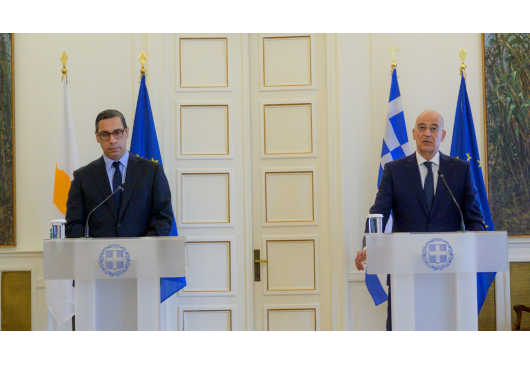 N. DENDIAS: My dear Constantinos, I welcome you to Athens, on your first visit as the new Minister of Foreign Affairs of the Republic of Cyprus. I’d like to congratulate you in person on assuming your new duties and wish you every success.
N. DENDIAS: My dear Constantinos, I welcome you to Athens, on your first visit as the new Minister of Foreign Affairs of the Republic of Cyprus. I’d like to congratulate you in person on assuming your new duties and wish you every success.
Unfortunately, our meeting today takes place at a time of mourning for Greece and Hellenism because of the tragic train accident in Tempi. Two Cypriot students are among the victims we are mourning.
I ‘d like to take this opportunity to thank my counterparts from all countries who have demonstrated their solidarity from the very first moment. The Ministry of Foreign Affairs and our missions abroad received numerous messages of support. And there were dozens of my foreign counterparts, including you and I thank you for that, who contacted me directly to offer their condolences to our country.
We are deeply moved by declarations of national mourning by the governments of Albania and Cyprus.
Ladies and gentlemen, our meeting today is part of the continuous cooperation and coordination between Greece and the Republic of Cyprus.
We had the opportunity to discuss issues of bilateral relations, but also important international developments, with an obvious emphasis, as you understand, on efforts for the settlement of the Cyprus issue.
The Cyprus issue is a top national priority of Greek foreign policy. We continue our full support for the achievement of a just and viable solution to the Cyprus issue, based on the resolutions of the United Nations Security Council, namely a solution of a bicommunal, bizonal federation, compatible with the European acquis.
We also discussed our efforts to prevent the upgrading of the pseudo-state internationally. In addition, we talked about our mobilisation in the European Union, the United States and our strategic and regional partners.
I had the opportunity to state to Constantinos that Greece will continue to stand by the Republic of Cyprus in its efforts to avoid new faits accomplis. After all, regarding the status of Varosha the relevant UN Security Council Resolutions are absolutely clear.
Of course, a key parameter, for a mutually acceptable solution to the Cyprus issue is the Turkish stance.
Ladies and gentlemen, Türkiye is experiencing a humanitarian tragedy. Greece has rushed to assist Türkiye with sincere willingness. Together with my Turkish counterpart, Mevlüt Çavuşoğlu, I was the first European Foreign Minister to visit the affected areas, where the Greek rescue units, EMAK, were already operating. Greece has continued and continues to send humanitarian aid to Türkiye.
Senior Turkish officials have publicly expressed their gratitude to the Greek government and the Greek people for our concrete solidarity and the sentiments we have expressed.
I want to acknowledge that Türkiye, for its part, sent similar messages of support, as soon as the tragic accident in Tempi was reported. The Turkish Foreign Minister was the first of my counterparts to call me to express his condolences.
The tragic incidents in Greece and Türkiye have brought our two societies closer and created a positive climate between us. It is too early to draw any firm conclusions as to whether this climate will be maintained at the political level as well. However, I believe that we should make the best use of it to normalise Greek-Turkish relations, which I believe will have a positive impact on efforts for the settlement of the Cyprus issue.
Greece is firmly in favour of dialogue, based, of course, on the United Nations Charter, respect for International Law and the International Law of the Sea, and the condemnation of the threat or use of force.
We had the opportunity, with Constantinos, to talk about the prospect of further enhancing relations between Greece and Cyprus in different areas: economy, trade, investment.
We decided to continue our cooperation on issues of global concern, such as migration, climate change and energy.
I had the opportunity to inform him about the organisation by Greece of the "Our Ocean 2024" Conference. This topic will also be included in the discussions during President Christodoulides' visit on Monday.
"Our Ocean Conference 2024" highlights the Eastern Mediterranean as a region with a catalytic role in environmental protection and, of course, in the energy decoupling of the European Union. Greece and Cyprus can play a key role in this regard.
We also had the opportunity to discuss the trilateral and multilateral formats in the Eastern Mediterranean region in which we participate: Greece-Cyprus-Egypt, Greece-Cyprus-Israel, 3+1 with the United States, and 3+1 with France.
We discussed our excellent cooperation within international organisations. I publicly thank Constantinos for the Cypriot support for our candidacy for the United Nations Security Council for the 2025-2026 term. I will have the opportunity to present the Greek candidature in New York next week.
Of course, we also talked about the Russian invasion of Ukraine, which is threatening European security, and endangering world peace and stability. It flagrantly violates International Law; it flagrantly violates the United Nations Charter. It calls into question the entire multilateral system of international rules.
Revisionism and expansionism must, ladies and gentlemen, be defeated. International law and the inviolability of borders must be respected.
My dear Constantinos, allow me to thank you warmly for your first visit today as Foreign Minister of the Republic of Cyprus – I’m certain that many more will follow.
Welcome to Greece.
Thank you very much.
March 9, 2023


